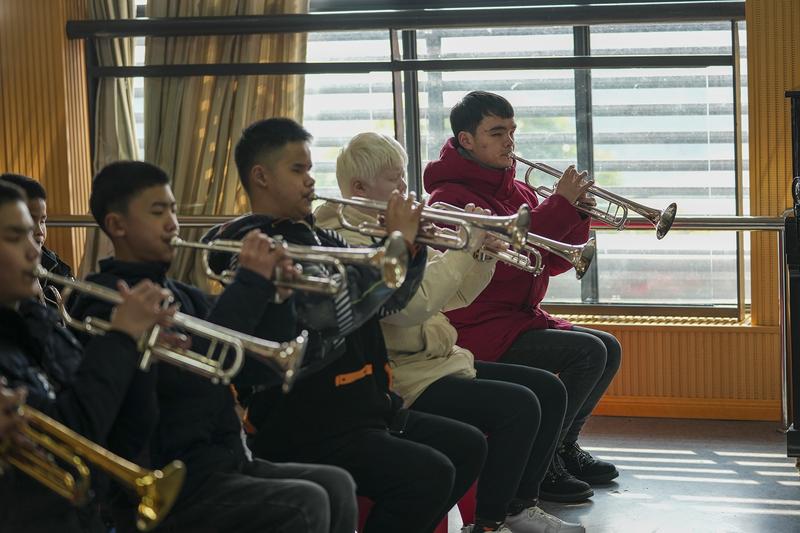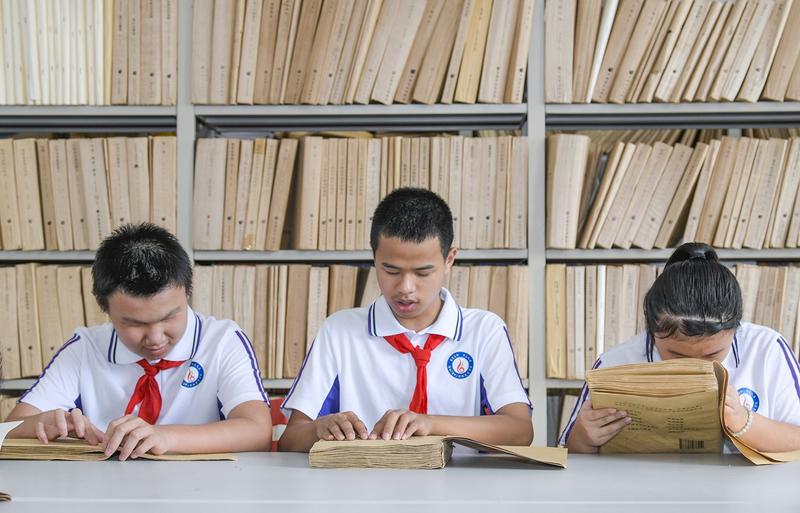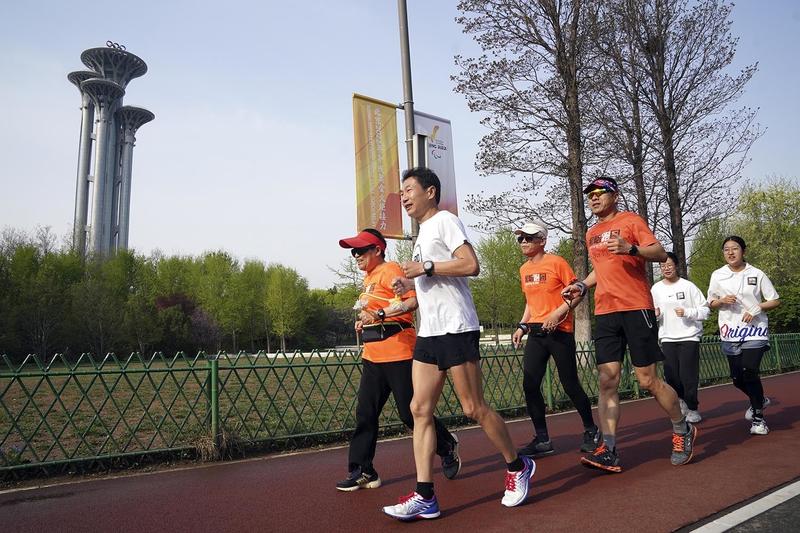Emerging barrier-free technologies offer better quality of life
 Gan Yunxiao, an 11-year-old who is visually impaired, plays piano at a special education school in Haikou, Hainan province. (YUAN CHEN / FOR CHINA DAILY)
Gan Yunxiao, an 11-year-old who is visually impaired, plays piano at a special education school in Haikou, Hainan province. (YUAN CHEN / FOR CHINA DAILY)
At 3 pm on a recent afternoon, 30-year-old Xiao Jia pulled back the curtains in her Beijing apartment, allowing warm sunshine to fall on 200 newly purchased lipsticks laid neatly in rows on the floor.
Xiao, who is blind, took out her phone and began a video call with a young woman, asking her: "Let me guess the color of this lipstick. Is it intense cherry red, or brilliant ruby? Is the color number 804 or 806?"
I can record static objects in my videos, but blind people may be able to record moving objects by using certain technologies. Many viewers initially think that I have a team to help me, but after seeing me shooting the videos, they know that I work by myself.
Chen Yan, 49, a visually impaired woman with a channel on the Douyin video-sharing platform, where she has 969,000 followers
The recipient of the call smiled and gave Xiao an answer.
Xiao, reportedly the first blind cosmetician in China, teaches other blind women how to use their sense of touch to wear makeup.
She sought help from the young volunteer she called to distinguish different colors of a large number of lipsticks. After the volunteer told her the color of that particular lipstick, Xiao marked the product, creating braille numbers with mini stickers.
In China, June 6 marked the 27th National Eye Care Day. For the past 10 years, blind and visually impaired people have experienced an improved quality of life and greater convenience thanks to emerging barrier-free technologies.
To call volunteers, Xiao uses a smartphone app designed specifically to help the blind. Three such apps are currently in use-two domestic ones, Xiao'aibangbang, which literally means "Mr/Ms Love please help", and Rebuild Eyes, along with a global app, Be My Eyes.
To use the apps, a blind person clicks on a virtual button on the screen, the system sends a video call to several volunteers, and the first respondent assists with the video chat.
However, some people may be reluctant to use the apps.
Tao Yong, a senior ophthalmologist and director of the ophthalmology department at Beijing Chaoyang Hospital affiliated to Capital Medical University, said, "The majority of visually impaired people I meet are extremely shy.
"I believe this has much to do with their lack of visual contact with the outside world. Seeking help from strangers is almost a last resort for many visually impaired people, but a necessary one."
 Visually impaired members of the Chongqing Special Education Center band practice at the venue. (LIU CHAN / XINHUA)
Visually impaired members of the Chongqing Special Education Center band practice at the venue. (LIU CHAN / XINHUA)
Similar functions
In China and overseas, many visually impaired people are choosing Vizwiz, an app developed in 2010 by Jeff Bigham, an associate professor in the School of Computer Science at Carnegie Mellon University in Pittsburgh, United States. This app performs similar functions to the others by using artificial intelligence, or AI.
A user scans a question via a smartphone, and the AI provides the answer. This app offers support from volunteers, who also answer questions.
On its website, Vizwiz publishes and routinely updates questions that users are asked. Of the 20,000 questions asked up to October 2020, nearly 30 percent, or 4,974, were related to recognizing an item that could not be discerned by touch.
Sometimes, as the Vizwiz questions show, a user cannot tell if a dog is sitting in front of him or her.
Yang Qingfeng, who is blind and director of Golden Cane, a program based in Beijing aimed at helping the blind and visually impaired, said the apps are helpful, but only a small percentage of visually impaired people are using them.
The two Chinese apps have some 110,000 users, while there are 400,000 global users of the Be My Eyes app.
However, the number of visually impaired people in China has long exceeded 17 million, and is growing by 450,000 annually. "We need more ways to make life easier for them," Yang said.
In addition to apps to call volunteers, other barrier-free technological devices are on offer.
 Blind students read Braille in the library at Haikou Special Education School. (KANG DENGLIN / FOR CHINA DAILY)
Blind students read Braille in the library at Haikou Special Education School. (KANG DENGLIN / FOR CHINA DAILY)
Chen Yan, a 49-year-old who is visually impaired, has a channel on the Douyin video-sharing platform, where she has 969,000 followers. She shares stories of her daily life, such as how she tunes pianos for customers, and how she travels with her husband, who also has poor eyesight.
She also shows how her guide dog Heimengmeng travels with them, and how the animal is either welcomed or rejected in public areas.
Two of the most frequently asked questions in her posts are: "Are you really blind? If so, then how do you make the videos, read our comments, and answer us?"
Chen showed a reporter how she makes recordings. She pointed the smartphone's camera in the general direction of her husband, with the phone able to tell if he was in the center of the screen. Chen then set up camera tripods and lighting.
After posting her work, she uses an app to read comments and interact with her audience.
"I can record static objects in my videos, but blind people may be able to record moving objects by using certain technologies," she said.
"Many viewers initially think that I have a team to help me, but after seeing me shooting the videos, they know that I work by myself."
Compared with video, audio is much easier for the visually impaired to handle. Everyone's Karaoke, a domestic app, allows users to sing karaoke to accompaniment, record their singing, share it and gain followers.
Several people are listed by the app as having the most followers. One of them, a blind woman who only wants to be known as Ms Yang, has 41,973 followers. She has uploaded 602 songs she has sung, each of which has been listened to by more than 10,000 people.
The app and similar ones such as Changba have adopted barrier-free modes, allowing blind users to listen to song lyrics they cannot see on screen, along with accompaniment.
Chen Hua, founder and CEO of Changba, said, "We asked our engineers to optimize all the app's 500-plus pages, so that visually impaired users can use them freely."
 Volunteers help the visually impaired during a run in April at Olympic Forest Park in Beijing. (CUI JUN / FOR CHINA DAILY)
Volunteers help the visually impaired during a run in April at Olympic Forest Park in Beijing. (CUI JUN / FOR CHINA DAILY)
Fresh chapter
New ways have also been developed to help the blind read books.
In 2012, the China Disabled Persons' Federation launched an audiobooks project. With support from major publishing and media groups, the project transformed books and television programs into audio versions and sent them to blind people.
In 2014, the Himalaya audio-sharing platform developed barrier-free access, which recognizes users' voices and helps them find the books they want. This function has been updated by the platform for the past eight years.
Furthermore, the visually impaired can also become program anchors, sharing their stories with audiences.
Ma Yinqing, a girl born prematurely in 1994 who became blind after breathing too much oxygen in an incubator, enrolled at Shanghai University of Traditional Chinese Medicine to major in blind massage.
She wanted to do something to better use her potential, so she learned to use audio-editing software to share with audiences recordings of herself reading books. Having amassed more than 1 million followers, Ma is one of the most influential anchors in China to impress audiences with her voice.
To ensure that barrier-free versions of books and other resources do not violate copyright, China handed the ratification paper of the Marrakesh Treaty to Facilitate Access to Published Works for Persons Who Are Blind, Visually Impaired or Otherwise Print Disabled to the World Intellectual Property Organization. The treaty took effect in China on May 5.
In 1991, the domestic copyright law authorized publishing groups to make braille versions of published books and other works without obtaining the copyright holder's approval.
Children targeted
To help the blind, Tao, the doctor, runs a program called See Me, placing the emphasis on children.
"For the visually impaired, childhood is the most important part of life, because their characters can easily become distorted and their education delayed," Tao said.
The program aims to reduce blindness rates through mass eyesight screening and by donating money to cover surgery costs, so that fewer children will become blind due to disease. Visually impaired children also receive psychological counselling, daily life skills training, education assistance and help in seeking jobs.
In 2014, Fang Huiwei, a 15-year-old girl from Guangxi Zhuang autonomous region, was diagnosed with leukemia. She survived thanks to a bone marrow transplant, but her retina was infected with a virus and she lost her sight.
However, she did not give up. She reads audiobooks, makes different-colored plasticene figures purely from memory, and writes poems about her life.
This is an extract from The Bird Seeking Light, her favorite poem.
I cannot feel the sun's color
But it is no less warm
Even in the world of darkness
The music is still moving
The stories are still exciting
The audiobooks still dream-catching
I have no fear because
I know there are people who care
Who push the world forward
Me included.
zhangzhouxiang@chinadaily.com.cn


